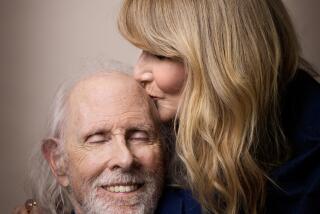Bruce Sinofsky dies at 58; Oscar-nominated documentary filmmaker
- Share via
Oscar-nominated documentary maker Bruce Sinofsky, whose films shined a light on controversial child murder convictions and the surprising offstage life of the band Metallica, died Saturday at his home in Montclair, N.J. He was 58.
The cause was complications of diabetes, Adeline Sinofsky, his daughter, said.
The Oscar nomination, shared with co-director Joe Berlinger, was for “Paradise Lost 3: Purgatory” (2011), their last film in a critically hailed series that questioned the evidence and courtroom tactics that led to the convictions of three men in the murders of three boys in rural Arkansas.
The first documentary in the series, “Paradise Lost: The Child Murders at Robin Hood Hills” (1996), won Sinofsky an Emmy for outstanding informational programming and sparked a protest against the convictions, which were obtained largely on circumstantial evidence.
The three convicted men were released in 2011. Damien Echols, who was sentenced to death for the crimes, tweeted Saturday about Sinofsky, “I will never forget his part in saving my life.”
Sinofsky said that during the filming, he became convinced that the then-teenagers accused of the crimes were easy targets for a grieving town because their lifestyles included listening to heavy metal music.
“If these kids lived in Manhattan, people wouldn’t have looked twice at them,” Sinofsky said in a 1996 Los Angeles Times interview.
Times television critic Howard Rosenberg called the film, shown on HBO, “stunning,” and said the filmmakers wove “verite sequences and formal interviews into a twisting, serpentine tale of intriguing ambiguity and paradoxes.”
Rosenberg criticized Sinofsky and Berlinger in 2000 when it was revealed that they paid a participant in the filming, but he still called them “superb storytellers.”
Members of the band Metallica, who often turned down requests to use their music in films, granted it for “Paradise Lost,” waiving their usual high fee.
The filmmakers’ relationship with Metallica helped gain them access to the group during the making of its album “St. Anger” in San Francisco. What could have been an extended music video turned into much more than that when trouble sprang up among members of the band that had been together for about 20 years.
The bickering got so out of hand that the group, like a long-married couple hitting a rough patch, went into therapy. It was jolting for the filmmakers, “like when you’re kids and you’re at a friend’s house and suddenly the mother and father start screaming at each other,” Sinofsky told The Times in 2004. “You don’t know whether to stay or leave.”
Metallica didn’t kick them out, so they stayed, obtaining rare footage of a head-banging band sorting out relationships.
The film, “Metallica: Some Kind of Monster,” came out last year.
Sinofsky was born March 31, 1956, in the Boston area and studied at New York University.
His most recent credit was for directing on “Oprah’s Master Class: Civil Rights Special” shown this year on the Oprah Winfrey Network.
In addition to his daughter Adeline, Sinofsky is survived by his wife Florence; daughter Claire; sons Alex, Tristan and Luc; brother Kenneth; and sister Deborah Gibbons.
Twitter: @davidcolker
More to Read
Start your day right
Sign up for Essential California for the L.A. Times biggest news, features and recommendations in your inbox six days a week.
You may occasionally receive promotional content from the Los Angeles Times.





